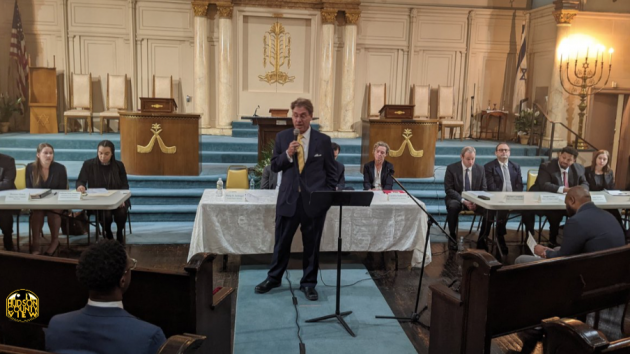At a town hall at Temple Beth-El in Jersey City, U.S. Attorney of New Jersey Philip Sellinger to discuss topics such as hate crime, police misconduct, violent crime, and civil rights.

By Daniel Ulloa/Hudson County View
“The mission of the United States Attorney’s Office is to enforce fed law on behalf of all the citizens of New Jersey. We’re your U.S. Attorney’s Office. We’re here to represent you,” Sellinger said during his opening remarks.
Sellinger explained the U.S. Department of Justice was established in the wake of the Civil War during Reconstruction to enforce civil rights and combat the Klu Klux Klan.
“KKK members were intimidating Black voters from voting. They were murdering Black residents, and they were lynching them. So the Department’s foundation was to bring thousands of cases prosecuting KKK members. That work on behalf of civil rights has continued,” he explained.
“One of the first things I did as U.S. attorney was to create a civil rights division which brings together criminal and civil prosecutors whose sole function is to protect the civil rights of those in our community.”
He added that hate crime is increasing, with the FBI noting that “domestic ultra-nationalist extremists” are the greatest threat to Americans today.
Furthermore, Sellinger explained that Asian Pacific Islanders, Hispanics, the LGBTQ community, Jews, African Americans, and Muslims have been increasingly targeted by hate groups.
“We are redoubling our efforts and have done so to protect the civil rights of our communities including and especially those who are targeted most often. Standing up to hate is one of our most important missions,” he declared.
Sellinger recalled that they recently charged an individual for allegedly throwing a Molotov cocktail at a synagogue in Bloomfield, as well as an individual who attacked Orthodox Jews in Lakewood in Ocean County.
“Every senseless killing and act of violence is tragic, and we are committed to devoting whatever resources are necessary,” he stated.
Sellinger also mentioned that they recently charged 10 gang members operating out of the Marion Court housing complex in Jersey City with three acts of murder, hundreds of acts of narcotics trafficking, robbery, and guns.
He explained they worked with Hudson County Prosecutor Esther Suarez, the Jersey City Police Department, Public Safety Director James Shea, and the Bureau of Alcohol, Tobacco, and Firearms (ATF).
This collaboration is part of the Jersey City Violent Crime Initiative (VCI), which is headed by two assistant U.S. Attorneys: Jamel Semper and Desiree Grace, both deputy chiefs of the criminal division.
While Sellinger lauded their efforts with local, county, and state partners, he acknowledged that officers who break the law must be held accountable.
“Regarding police misconduct, we work regularly with police officers who show tremendous dedication and hard work to keep the public safe. We understand they work under difficult circumstances. But at the same time, we’re charged with enforcing the constitutional rights of the citizens of New Jersey,” Sellinger noted.
“Over the last several years, we’ve brought a number of cases involving officers of the Paterson Police Department.”
Sellinger explained that they prosecuted eight officers known as the “Robbery Squad,” which stopped citizens and stole from them using excessive force. The City of Paterson has since filed suit against them to recoup losses.
“The Newark Police Department was involved in systematic constitutional stop searches arrests, disproportionately of Black people, sometimes using excessive force. We entered into a consent decree under court supervision where Newark was essentially required to transform itself. Body-worn cameras were required, de-escalation training was required, and a prohibition against retaliatory policing,” the top federal prosecutor in the state added.
He also said his office doesn’t shy away from prosecuting corporate crime or public officials who violate the public trust.
Linda Ortiz and Matthew Lattimer, both of the U.S. Department of Justice’s Community Relations Service, facilitated public questions that had been posted on white boards, beginning with asking about the Paterson police’s killing of activist Najee Seabrooks as he was in the midst of a mental health crisis.
“Community organizations want to know if you will investigate the death of Najee Seabrooks in Paterson and if the Justice Department will investigate the Paterson Police Department,” Lattimer read.
Sellinger expressed remorse for the tragic situation, but said he couldn’t say say much more since it is an ongoing investigation.
“We are saddened of course by the death of Mr. Seabrooks in Paterson. We are limited to what we can say and can’t comment on the particulars of that case or any other case. We take any matter involving allegations of police misconduct very seriously. We’re concerned about the safety of the citizens of Paterson,” he stated.
“To have a federal case regarding police misconduct, you got to meet certain specific requirements for federal offenses, and you got to be able to prove that beyond a reasonable doubt. Our office spares no resources looking at these matters.”
Ortiz then read some questions asking about how to handle employee discrimination in the Jersey City Public Schools, with one inquiry also alleging that Title I funds not being distributed appropriately.
“Someone can file a complaint with the EEOC (Equal Employment Opportunity Commission), and the EEOC will then conduct an investigation. Once their investigation is complete … then it does get referred to the Justice Department. If there is a pattern of practice of discrimination in the school, one can file a complaint with the U.S. Attorney’s office,” Assistant U.S. Attorney Michael Campion explained.
He added that the U.S. Department of Education’s Civil Rights division might also handle such issues.
Another questions asked what was being done to ensure more police transparency and accountability, to which Sellinger used the example of their case against the Newark PD, where the courts forced them to reform their tactics.
Ortiz asked how hate crimes are addressed.
“We have a hotline where you can call and leave a message. You can also fill out a complaint form. I read all of them… and send them to the FBI. We take them all seriously,” Senior Civil Rights Counsel Joseph Gribko replied.
“What do you plan to do to address landlord collusion, anti-trust violations, and consumer fraud in rental price fixing? Will you join the current suits vs. Real Page and the DOJ?” another question asked.
“Issues regarding crime, anti-trust violations, housing changes … comes within federal jurisdiction. We ask the community to advise us, and… we’ll investigate those allegations,” Sellinger responded.
Lattimer asked what they could do about housing issues.
“We can bring lawsuit, and the court can reach a settlement. Some of the settlement … does go to educate consumers about types of financial literacy programs that are available. What we need first is a violation of civil rights law,” Campion said.








